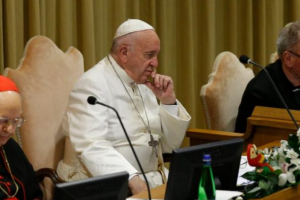(Catholic Business Journal may or may not agree fully with the opinions expressed in this article and those referenced at the end, however we do believe these articles make very important points worth considering, especially by Catholic business leaders—See first article below and others at the end —ed.)
Catholic doctrine teaches that both poverty and wealth are means that can serve to reach our main goal, which is eternal salvation.
For this reason, the Church does not condemn being rich or poor. Instead, she criticizes people’s attachment to riches or their contempt for poverty, since these attitudes are at odds with the First Commandment: “Love the Lord thy God above all things.”
The Church also encourages the proper use of earthly goods to serve self and neighbor. Our Divine Savior teaches, “Seek ye first the kingdom of God and his justice, and all these things shall be added unto you” (Luke 12:31). Thus “all these things” (wealth, health, beauty, etc.) are good when sought while “seeking the Kingdom of God.”
That is why the Church has never promoted poverty as an ideal for everyone. On the contrary, she always considered poverty as an exceptional ideal reserved for the few called for greater perfection in the religious state.
Indeed, the Church elevates to the honor of the altar, both rich and poor, disregarding their material goods or the lack thereof.
Furthermore, the traditional doctrine of the Church calls upon all Catholics to seek the necessary means for their subsistence by using their ingenuity and willpower.
This obligation and possibility are not limited to subsistence. Every person, according to his or her capacity, should use honest means to legitimately seek self-sufficiency, comfort and even luxury when ordered toward holiness, our ultimate end.
The Church, as a Mother and Teacher, provides an admirable example of these truths with Her own existence. She has splendid cathedrals, sumptuous abbeys and magnificent vestments for celebrating the liturgy. At the same time, the Church praises the ideal of poverty and total renunciation of earthly goods for those wishing to practice it voluntarily.
Those who choose the ideal of poverty are not promoting a “pauperist” ideal of life. On the contrary, everyone knows how these religious men and women professing poverty in convents and monasteries produce many of the most exquisite liquors such as Bénédictine, special beers and famous cheeses.
A reader might think that recalling these obvious truths is a waste of time since all Catholics know them.
Unfortunately, that is not true. Theologians billeted inside the Church under the false name of “progressives” deny these truths, which until recently were obvious and beyond discussion. They argue that poverty is the ideal that all society must practice as if it were a … Read more>>
RELATED RESOURCES:
-
Vatican II’s forgotten apostle of the poor stages comeback at Amazon synod — by John Allen, Jr., Crux
-
Many Amazon Synod prelates pledge to preserve native ‘spiritualities’ in alarming Catacomb pact—LifeSite News
-
The third and final week of the Synod begins with a splash—by Mary Jo Anderson, Catholic World Report
-
Inculturation: Critics of Amazon synod ignore facts of history—Robert Mickens, La Croix International
-
What the Pan-Amazon Synod should learn from the Church’s missionary past—by



You must be logged in to post a comment.